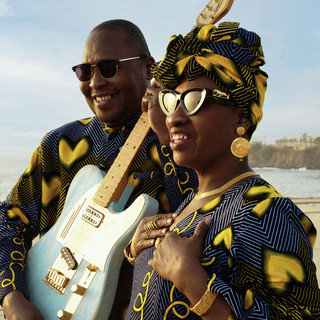After my friend Youssou N’dour of Senegal whom I met and interviewed here in Lagos, three other African music stars whose rhythm and melody inspire me when I am writing are three Malians: Salif Keita, Ali Fakir Toure and the husband and wife blind musical duo of Amadou & Mariam. The sad news is that one of the pair, the male singer and funky guitarist Amadou is dead. They are the Romeo and Juliet of global music, not just African music.
There are love stories, and then there is Amadou & Mariam—a tale so rich in devotion, resilience, and music that doesn’t alienate, regardless of the colour of your skin or musical preference. For decades, the blind Malian couple enchanted the world with their hypnotic blend of Afro-blues, rock, and traditional West African rhythms, crafting songs that pulsated with joy, sorrow, and an unshakable belief in love. Their music was a bridge—between continents, between cultures, between the seen and unseen worlds. It’s a kind of music tailored for an adventurous and eclectic person like me with diverse musical interest.
And then, on April 4, 2025, the unthinkable happened. With shock and a broken heart, I heard on BBC that Amadou Bagayoko, the virtuoso guitarist with the warm, gravelly voice, had passed away at 70, leaving behind his wife, Mariam Doumbia, and a legacy that reshaped global music. On hearing the news, I couldn’t continue eating breakfast. The food turned to ashes in my mouth. The news sent shockwaves through the global music community. Like me, fans of Amadou & Mariam from Bamako to Lagos to Berlin and the world all over mourned, not just the loss of a brilliant musician, but one half of a love story that had become synonymous with hope.
Now, as the world adjusts to a future without Amadou’s riffs echoing alongside Mariam’s crystalline vocals, one question lingers: What happens to the music when half of the soul is gone? This was the question I asked myself as I played all day their music from my Apple Music playlist.
Blindness, Love, and the Birth of a Sound
Amadou and Mariam met in the 1970s at Mali’s Institute for the Young Blind, where they bonded over music, dreams, and the shared experience of navigating a world not built for them. Amadou, who lost his sight at 16, was already a skilled guitarist, while Mariam, blind since childhood, possessed a voice that could stop time. Together, they forged a sound rooted in Malian tradition but electrified by Amadou’s love for rock legends like Jimi Hendrix, Carlos Santana and Pink Floyd’s guitarist David Gilmour—a childhood hero.
Their early years in Bamako’s music scene were tough—being blind musicians in a competitive industry meant constant struggle. But they had each other. “We didn’t see the obstacles,” Amadou once said. “We only heard the music.”
By the 1990s, they were stars in West Africa, but global fame came later, thanks to their 2004 breakthrough album Dimanche à Bamako (Sunday in Bamako), produced by French musician Manu Chao. Tracks like “Senegal Fast Food” and “Coulibaly” became instant classics, blending Bambara lyrics with irresistible grooves. Suddenly, the world was dancing to Amadou & Mariam.
What made them so irresistible was the way Amadou’s guitar lines slithered between blues and desert rock, or how Mariam’s voice—soft yet commanding—could make even the most hardened listener sway. On stage, they produced sheer joy, danced, laughed, and played with the energy of musicians half their age.
They toured with Coldplay, collaborated with Damon Albarn, and performed at the Olympics. They sang about love, politics, and everyday life in Mali, never losing touch with their roots. And through it all, they remained each other’s anchors.
In interviews, they often finished each other’s sentences. On stage, they stood close, their hands occasionally brushing as if to confirm the other was still there. Their love wasn’t just romantic—it was musical, spiritual, a dialogue that needed no words.
When news of Amadou’s death broke, tributes poured in from across the globe. “An absolute legend,” wrote Damon Albarn. “His music was pure light,” added Angelique Kidjo. But the most heartbreaking silence came from Mariam, who has always been the quieter half of the duo.
What does the future hold for her?
Those close to the couple say Mariam is resilient. She still sings, still carries their music in her bones. There are whispers of unreleased recordings, of collaborations left unfinished. Perhaps she will continue, not as half of Amadou & Mariam, but as a torchbearer of their legacy.
But it’s impossible to imagine their music without Amadou’s guitar—that funky, golden sound that wrapped around Mariam’s voice like a protective embrace. Maybe that’s the tragedy of great duos: when one leaves, the song can never be the same.
Amadou & Mariam’s greatest gift was their ability to make darkness sound luminous. They taught us that blindness was never a barrier—only a different way of seeing. That love could be a melody, a rhythm, a language beyond sight.
Amadou may be gone, but the music remains. Every time “Sabali” drifts through a speaker, or “Je Pense à Toi” plays in some dimly lit bar in Bamako, they are there. Still dancing. Still in love. Still proving that some songs never really end—they just change key.
And as long as Mariam breathes, their story isn’t over.
For now, we listen. We remember. And we thank them—for the music, the love, and the light they brought into this world, even in the darkest of times.
Amadou’s passing is a profound loss, but his music, and the music he created with Mariam, will forever be a gift, a reminder that even in the face of adversity, love and music can conquer all. And as a big fan, I will continue to listen, to celebrate, and to cherish the extraordinary legacy of Amadou & Mariam—the blind singers of Bamako, the modern troubadours of Mali, the land of griots. Rest on Amadou! Reposez-vous bien!
Share your story or advertise with us: Whatsapp: +2347068606071 Email: info@newspotng.com

















